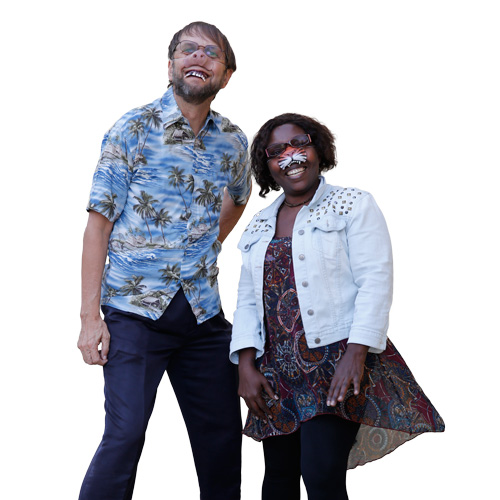Jesse Grismer lists three factors that make La Sierra’s biology program a hot spot for undergraduate research.

“I don’t care a whole lot about being in the spotlight,” says biologist Jesse Grismer. “What I care about is having the freedom to pursue the research I’m really passionate about.”
Jesse has achieved both freedom and a measure of fame as a biology professor at La Sierra University. He and his father, renowned herpetologist Lee Grismer, earned worldwide attention several years ago when they discovered an extraordinary, all-female self-cloning lizard species in Vietnam.
“That’s the type of happy accident that comes from doing the kind of science that you love,” Jesse says.
“I’ve always pursued whatever I found interesting,” he explains. “When I was finishing my doctoral degree in biology and starting to think about jobs, I had three criteria. I wanted to live in a great location. I wanted to work closely with students. And I wanted to do research that’s meaningful to me. La Sierra University checked all three boxes.”
The same principles also define the student experience for La Sierra’s biology majors, Grismer adds. “Our bachelor of biology degree is perfect for anyone who’s interested in doing great undergraduate research,” he says. “The department faculty treat biology majors like graduate students. They take the lead on their own projects, they present at conferences, and they write and publish their own papers. They get to be a lot more involved than students at most universities who are doing support work on their professors’ research. Our students are doing their own science.”
Q+A With Jesse Grismer, Assistant Professor of Biology

What’s it like to work in the same biology program as your dad?
It’s pretty cool, but our research interests diverged a long time ago. I do a lot of DNA-related stuff, and he’s focused on functional anatomy. We have an area of overlap, but there’s a big area of divergence—and that’s great for La Sierra’s biology degree. Students come into our lab with a wide range of research interests, and we can support almost any project because of our combined expertise.
How do La Sierra’s undergraduate research opportunities differ from other biology degrees?
Several reasons. First of all, southern California is a biodiversity hot spot. You have the ocean, the mountains, and the desert, so there’s easy access to all kinds of ecosystems and questions.
Second, La Sierra doesn’t offer graduate degrees in biology, so faculty are working directly with undergraduates. You’re supervised by a PhD professor, so you’re really getting a graduate-level experience. When our biology majors present at conferences, they’re beating grad students for awards.
But here’s the biggest thing that sets us apart from other biology degree programs: you can pursue whatever research you want. La Sierra’s philosophy is that all research is valuable, whether or not it’s published in a high-prestige journal or attracts a million-dollar grant. As long as you’re excited about a project, we’ll support you.
That’s one of the reasons we’re really good at getting our biology majors into graduate schools. A high percentage of our graduates go directly to graduate biology programs, medical school, vet school, and so forth. Our placement rate is way above the national average for biology degrees.
How do La Sierra’s undergraduate research opportunities differ from other biology degrees?
Several reasons. First of all, southern California is a biodiversity hot spot. You have the ocean, the mountains, and the desert, so there’s easy access to all kinds of ecosystems and questions.
Second, La Sierra doesn’t offer graduate degrees in biology, so faculty are working directly with undergraduates. You’re supervised by a PhD professor, so you’re really getting a graduate-level experience. When our biology majors present at conferences, they’re beating grad students for awards.
But here’s the biggest thing that sets us apart from other biology degree programs: you can pursue whatever research you want. La Sierra’s philosophy is that all research is valuable, whether or not it’s published in a high-prestige journal or attracts a million-dollar grant. As long as you’re excited about a project, we’ll support you.
That’s one of the reasons we’re really good at getting our biology majors into graduate schools. A high percentage of our graduates go directly to graduate biology programs, medical school, vet school, and so forth. Our placement rate is way above the national average for biology degrees.

What research specialties is La Sierra’s biology department best equipped to support?
My dad and I work with students who are interested in everything from population genetics to adaptation and the evolution of unique morphologies. If you’re interested in marine biology, Lloyd Trueblood does amazing research. Arturo Diaz, another member of our faculty, is a virologist who’s doing incredibly innovative work on phage therapy. He’s a total rock star. La Sierra is one of only a handful of undergraduate biology degrees in the country where you can participate in this kind of research.
Those are just a few examples. The bottom line is that you can explore your passion in our biology program. Whatever you want to do research in, we’ll set you up to succeed.
What do you enjoy most about teaching in La Sierra’s biology program?
It’s very rewarding to introduce people to new knowledge and new skills—to help them discover something they’re good at and passionate about. I’m very aware of how that kind of mentorship affected me, and I’m grateful for it. I care about biology and I care about animals, so it’s important to me to help nurture the next generation of biologists. We need more people getting biology degrees and solving more environmental problems.



